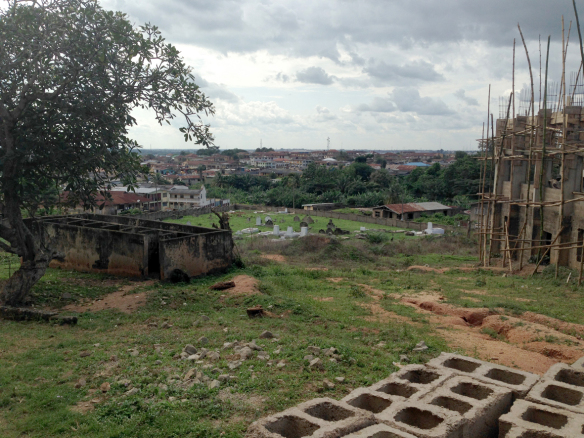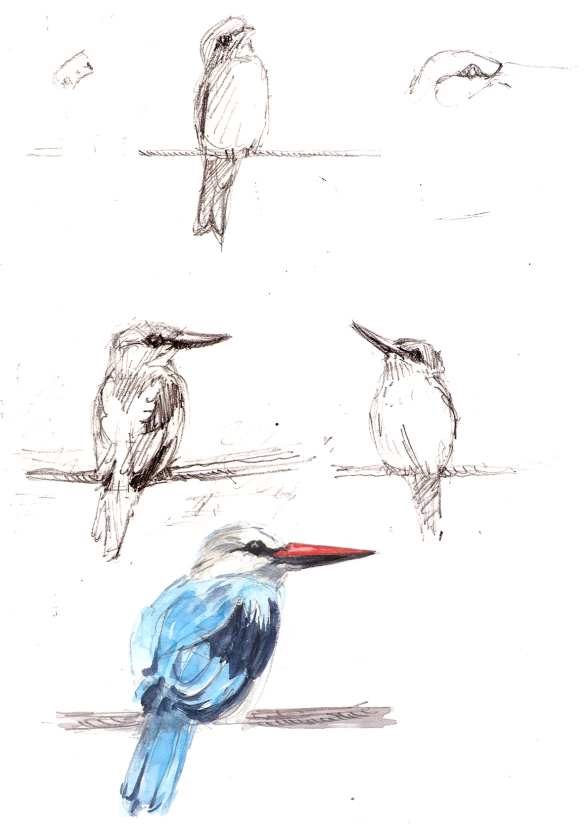I’m standing on the balcony of the newly named Entrepreneurship Development Centre, Emir Haruna Road, Kebbi. Directly opposite is a door and gatemaker’s yard. There seems to be a standard size, with most having quite intricate patterns welded on to the panel faces. The sun is high and the shadows are short. A hawk swoops by fast and straight across the road and disappears over the trees. Could have been any one of a dozen or so species, but the silverbill finches in the small tree in the yard remain undisturbed.
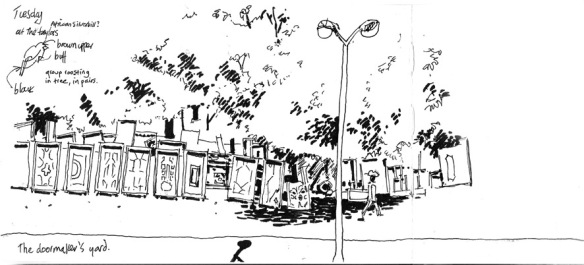
A man passes by dressed entirely in white with a white tray on his head, too far away to see what was in the tray, suffice to say it was also white. The finished shiny doors catch the sun as they lean on the perimeter fence on display, and the occasional welding flash erupts from the rusty stacks of sheet metal in the yard, shaded by the Neem trees.
The Centre is set up to give young people a helping hand setting up their own art and craft business, anything from shoemaking and beadwork to basketry and jewellery. The taylors are the main focus though, and have been brought here from Osogbo in the South to expand their business. They have a full order book.
Something of a hub of operations for Jumoke’s various business endeavours, the Centre is being visited today by the Kebbi State governor’s wife, Doctor Zainab Atiku Bagudu. Thanks to some frantic phone calls and last minute changes of schedule in response to the (inevitable) short notice her PR team gave, everything is in place to show off the products and talents on offer. She is due to arrive at ten. Five hours later an advance security detail appears and gives the layout and exits a once over and quietly informs us the official cars will arrive within the next half hour.
I watch from the balcony as the motorcade overshoots, reverses up the road and pulls in to the forecourt, all this maneuvering causing them to temporarily close the road while the vehicles assemble. Across the road boys on machines with their pillion passengers stop to look on. Half a dozen soldiers step out of their black SUV, and are directed to the perimeters of the forecourt by their commander who looks pretty cool in his dark glasses and beret. At this point I move inside to be on hand as the governor’s wife and daughters with entourage and photographers duly arrive upstairs and their tour begins. The whole place is suddenly jam packed with colourfully dressed ladies with their PR contingent taking photos and video on various cameras and tablets.
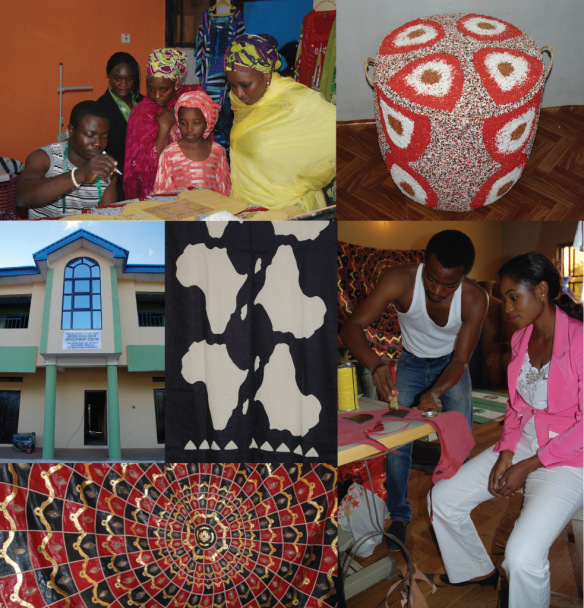
I am introduced as a foreign visitor and only just managed to remember the Islamic etiquette to not shake hands, but not before my arm flinched upwards. Thanks to a very discreet slight body movement as a prompt from Dr. Bagudu my arm stayed down. I’m sure only the two of us noticed! As the cameras turn my way she asks “And have they shown you some interesting places around Kebbi?” “Yes we visited the Argungu fishing village yesterday which was…”
I started to reply, not finishing my sentence as she turned towards the cameras and staff taking down notes, “I was brought up in Argungu” she proceeded, recounting a childhood detail. I could see how well Dr. Bagudu was versed in the whole meet and greet side of being a public figure here, and how cleverly she turned the question into a self
promotional anecdote for the cameras. I also appreciated how carefully managed
these things are, despite the (again, inevitable) schedule overrun.
When it was time to leave, a group of people were waiting by the vehicles for handouts. News travels fast around here, I thought, as it seemed only half an hour or so had passed since they first arrived. “I hope you enjoy the rest of your trip” Dr Bagudu said with a smile as I took her photo. “I’m sure I will” I confidently replied. Lengthy goodbyes were exchanged and everyone climbed back into their respective vehicles and left. The whole visit was chalked up as a success.

Earlier today we bought tickets for our flight to Lagos. Once reserved over the phone, we buy the tickets at the bank using cash. At the ATM, the N60k needed plus another N20k for later gives me a fat wallet which I give up trying to close, it’s only a short walk after all. The revolving door ‘capsules’ are supervised by an attentive security guard in paramilitary style uniform and I can’t help thinking if they also serve to keep the sand outside. Inside the bank there are a dozen or so men standing and sitting waiting for this or that. Most staff are dressed western style and very smartly, with many busy conversations ongoing at once, unlike a western bank which in contrast seems to be a place of orderly silence. Although there are computers, things written on paper are still an important part of proceedings here. We are ushered through to a back room where we will hand over our cash. There are piles of paper files, counterfoils and banknote wraps strewn here and there and our money is counted by an old but very serviceable counting machine. We pass back through the tiny revolving capsules and back out into the blazing sun.
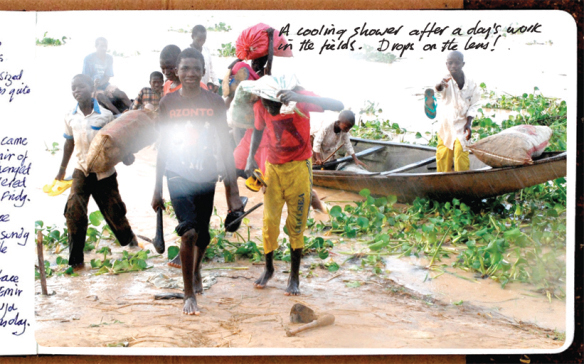
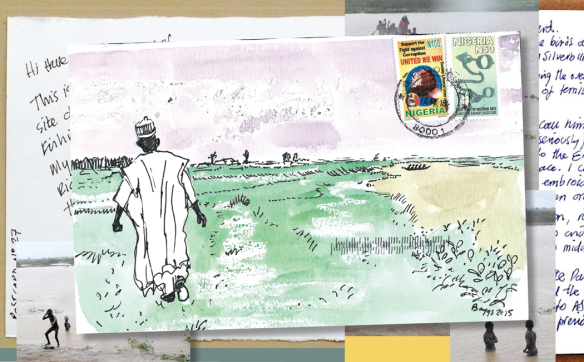
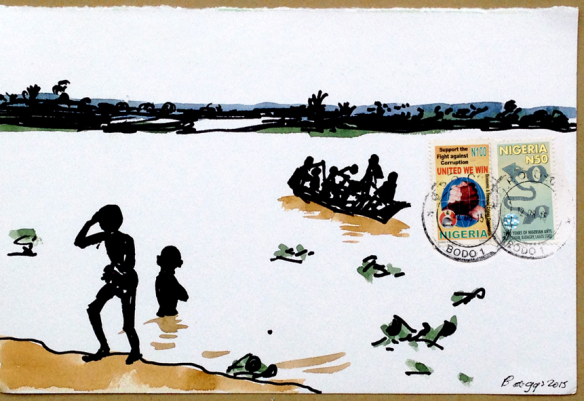
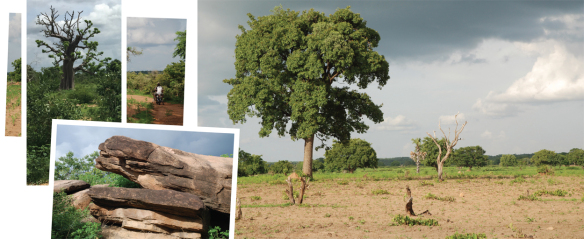
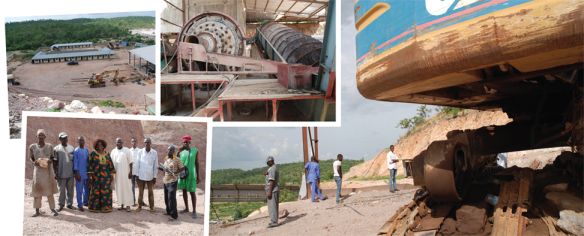
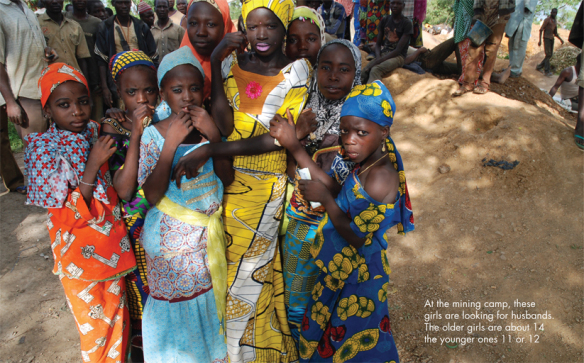
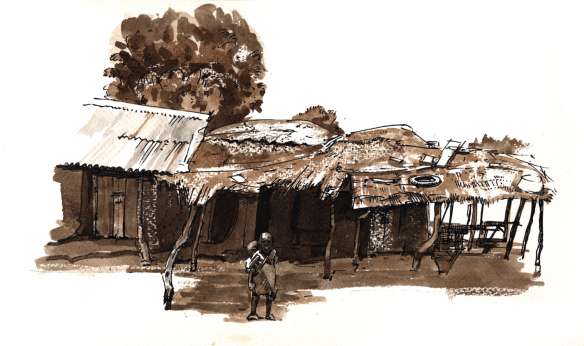
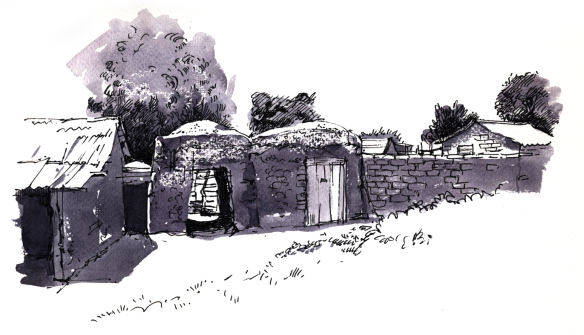
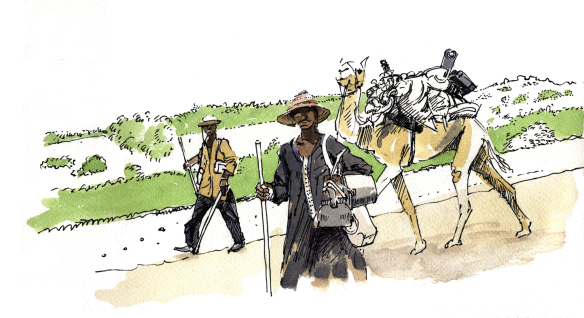
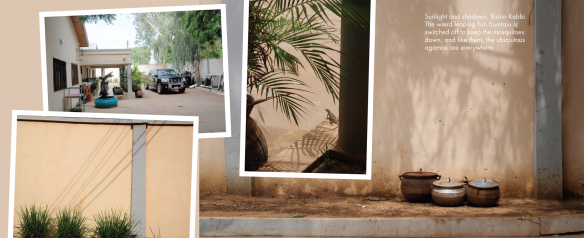 After freshening up, chicken rice and spinach is served, followed by water melon
After freshening up, chicken rice and spinach is served, followed by water melon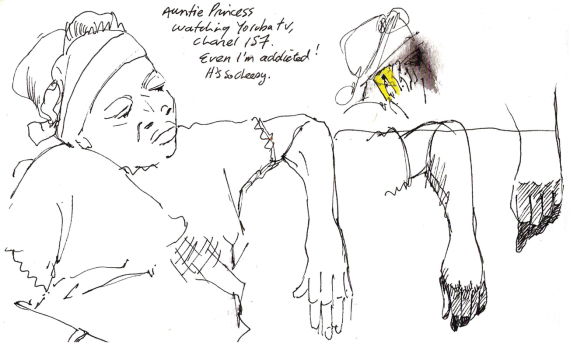 The same wall of heat hits me after dark as I step outside to make my way to our apartment. By lamplight, I see one or two moths, but dozens of large cockroaches
The same wall of heat hits me after dark as I step outside to make my way to our apartment. By lamplight, I see one or two moths, but dozens of large cockroaches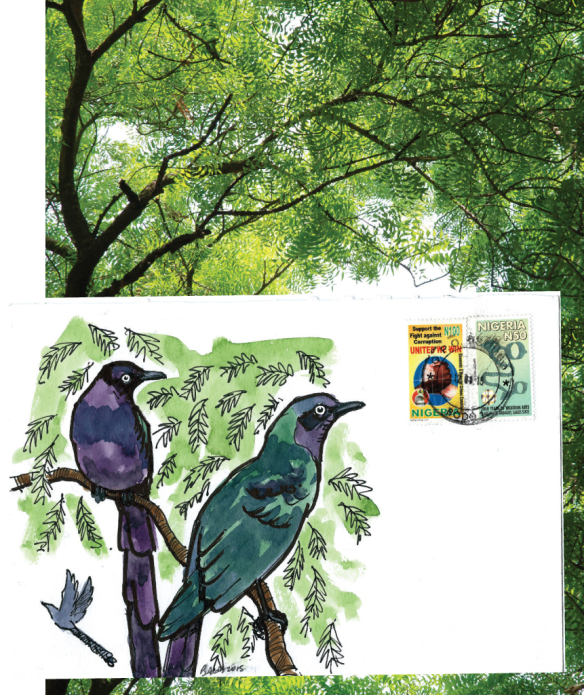 I was familiar with these birds from ‘The Handbook of Foreign Birds’, where they were described as not for the novice, and could be quite aggressive towards weaker inmates
I was familiar with these birds from ‘The Handbook of Foreign Birds’, where they were described as not for the novice, and could be quite aggressive towards weaker inmates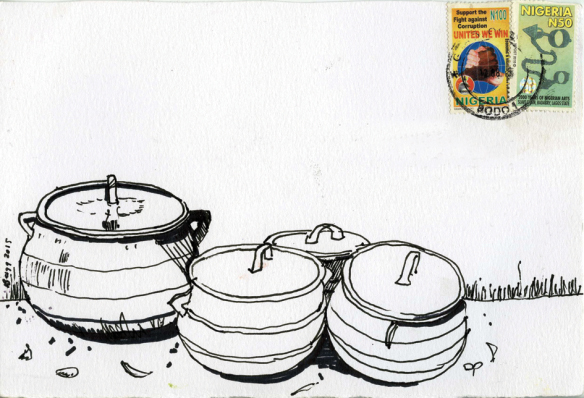
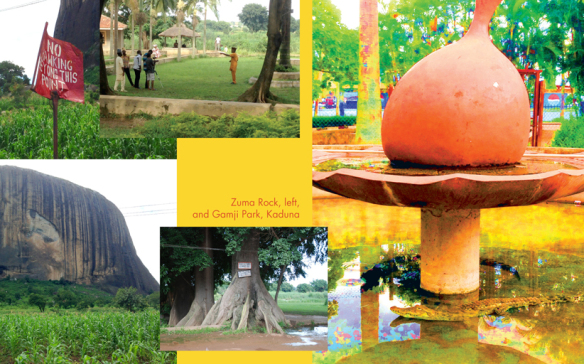 Toyin grew up in Kaduna and worked in the family hairdressing business in the town.
Toyin grew up in Kaduna and worked in the family hairdressing business in the town.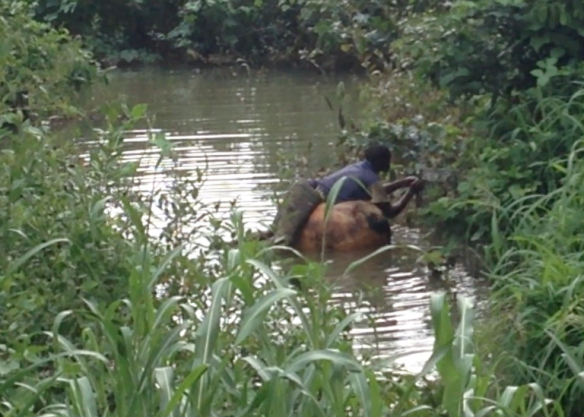 Being adventurous and naive in equal measure I opt for a short walk along the lush riverbank which entails climbing through the broken chain link fence, which I manage relatively gracefully, and largely because I hear some exotic bird calls and hope to catch a glimpse. Sadly their identity remains a mystery. We did come across a fisherman however, who seemed quite happy to show us his catch inside the hollow calabash he was carrying above his head, and to show how he uses it as a float while he paddles to check his nets. Any fish are placed inside the calabash while he paddles off to the next net. ‘Are there crocodiles in the river?’ I ask, mentally assessing the risk the fisherman is taking ‘Yes’ said Sam, adding after a short pause ‘…though for a Nigerian, a crocodile is more an opportunity than a danger.’ I look down at my shoes, imagining what that might mean for Lowo’s handbag trade.
Being adventurous and naive in equal measure I opt for a short walk along the lush riverbank which entails climbing through the broken chain link fence, which I manage relatively gracefully, and largely because I hear some exotic bird calls and hope to catch a glimpse. Sadly their identity remains a mystery. We did come across a fisherman however, who seemed quite happy to show us his catch inside the hollow calabash he was carrying above his head, and to show how he uses it as a float while he paddles to check his nets. Any fish are placed inside the calabash while he paddles off to the next net. ‘Are there crocodiles in the river?’ I ask, mentally assessing the risk the fisherman is taking ‘Yes’ said Sam, adding after a short pause ‘…though for a Nigerian, a crocodile is more an opportunity than a danger.’ I look down at my shoes, imagining what that might mean for Lowo’s handbag trade.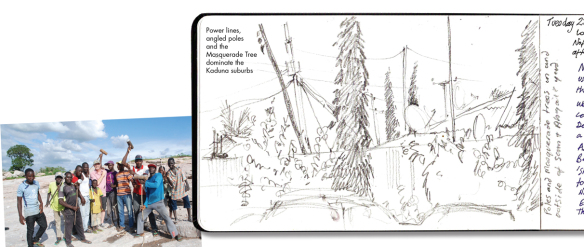
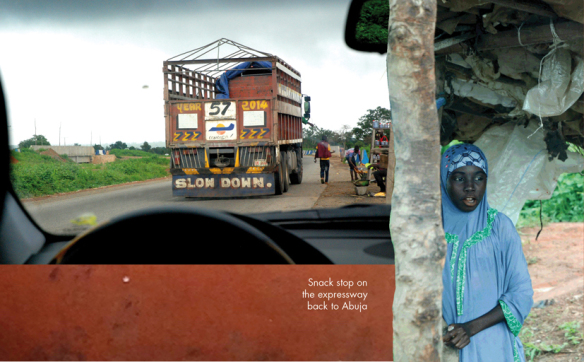 Sam and Abi are driving us back to Abuja this morning. We stop briefly for corn sticks roasted while you wait. Staying a few days with us until we leave for Birnin Kebbi turned out to be a happy decision, as we were able to spend a few more days in their good company while we figured out the best way of getting there, an internal flight or a nine hour drive.
Sam and Abi are driving us back to Abuja this morning. We stop briefly for corn sticks roasted while you wait. Staying a few days with us until we leave for Birnin Kebbi turned out to be a happy decision, as we were able to spend a few more days in their good company while we figured out the best way of getting there, an internal flight or a nine hour drive.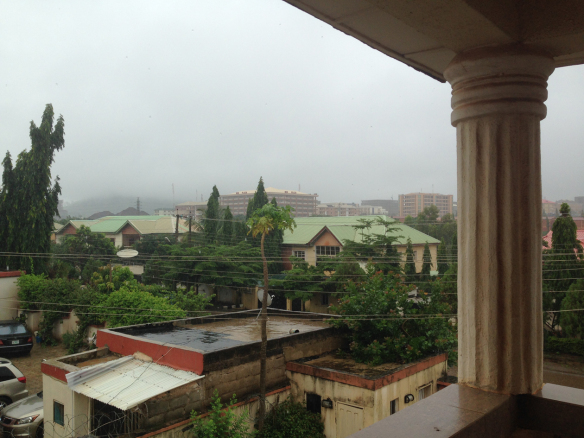 The swallows and swifts are not deterred for long. When the sun comes out, it’s blinding and hot. The Variable Sunbirds flit quickly to and fro on the flowers in the garden, the fire finches find seeds on the ground in the yard. The African Thrush sings loudly very like the European song thrush, with simple but fluid repeated phrases. I started the Moleskine sketchbook on the ‘plane, and already made some notes on the suburban birdlife for later.
The swallows and swifts are not deterred for long. When the sun comes out, it’s blinding and hot. The Variable Sunbirds flit quickly to and fro on the flowers in the garden, the fire finches find seeds on the ground in the yard. The African Thrush sings loudly very like the European song thrush, with simple but fluid repeated phrases. I started the Moleskine sketchbook on the ‘plane, and already made some notes on the suburban birdlife for later.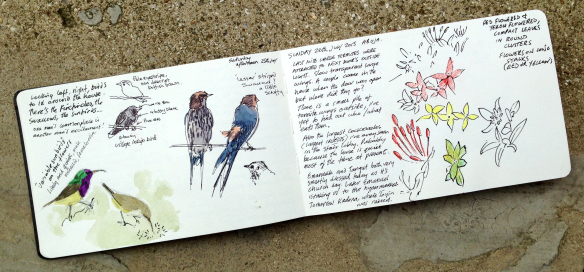
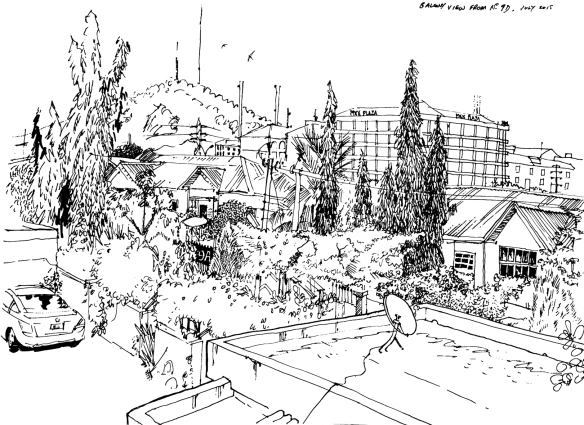
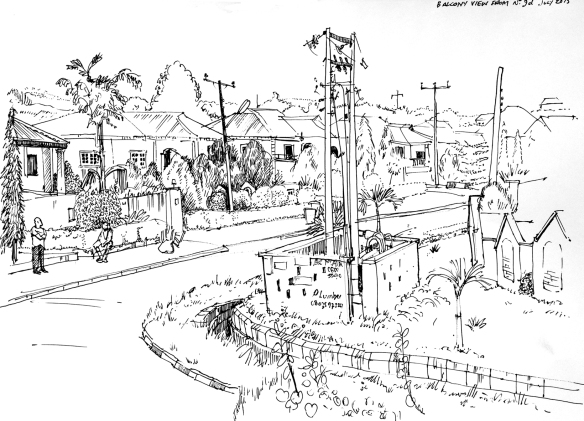 So, here we are again. Another rip roaring, roller coaster high energy ride for a few weeks through this fantastic country…just hope I can keep up…
So, here we are again. Another rip roaring, roller coaster high energy ride for a few weeks through this fantastic country…just hope I can keep up… These days Baba likes to read, and also keeps up with current events via CNN and BBC but is also amused by the Nigerian soap operas, with their purposeful, wide eyed overacting and shouty storylines. There goes a man who has seen many things, and
These days Baba likes to read, and also keeps up with current events via CNN and BBC but is also amused by the Nigerian soap operas, with their purposeful, wide eyed overacting and shouty storylines. There goes a man who has seen many things, and

 Nearby is a plot of land owned by the family, and Jumoke is developing it as a cafe and art centre. Work had just started as we visited. The site has a pretty stream with characteristic large boulders, banana plants and a tall old palm, which will make an ideal backdrop for the thatched parasol outdoor seating that’s planned.
Nearby is a plot of land owned by the family, and Jumoke is developing it as a cafe and art centre. Work had just started as we visited. The site has a pretty stream with characteristic large boulders, banana plants and a tall old palm, which will make an ideal backdrop for the thatched parasol outdoor seating that’s planned. Opposite the site is a churchyard with mature trees and gardens giving the neighbourhood a relaxed suburban feel, and next to that is the Justice Development
Opposite the site is a churchyard with mature trees and gardens giving the neighbourhood a relaxed suburban feel, and next to that is the Justice Development
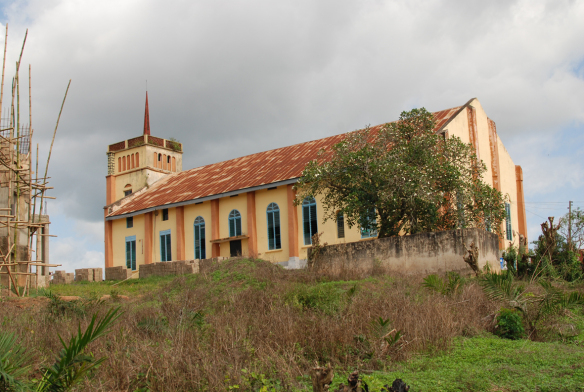 While we wait for our helper to arrive on the back of a ‘machine’, we start collecting old drinks cans, pieces of broken tile and general litter from around the site into an empty bucket sized paint can, itself a piece of litter! I’m grateful for my hat, and already thinking we haven’t brought enough water. A Woodland Kingfisher perches patiently on a wire across the road, and later presents a trophy to its mate,trilling loudly withy much excitement, on a horizontal branch of a tree in the grounds. I couldn’t make out the prey item, but guessed at a small lizard.
While we wait for our helper to arrive on the back of a ‘machine’, we start collecting old drinks cans, pieces of broken tile and general litter from around the site into an empty bucket sized paint can, itself a piece of litter! I’m grateful for my hat, and already thinking we haven’t brought enough water. A Woodland Kingfisher perches patiently on a wire across the road, and later presents a trophy to its mate,trilling loudly withy much excitement, on a horizontal branch of a tree in the grounds. I couldn’t make out the prey item, but guessed at a small lizard.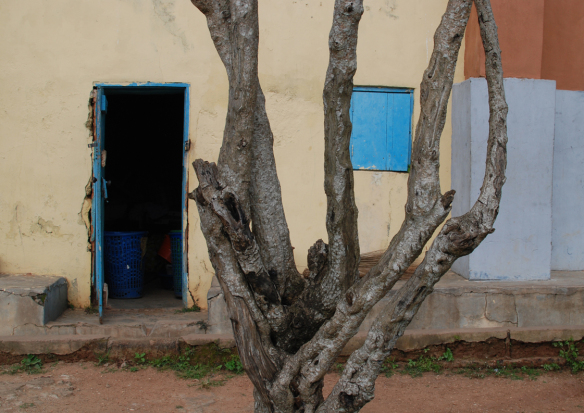 Our helper arrived and proceeded to start cleaning the marble with detergent. Standing close to two slabs of concrete lying near the wall and in bare feet, he suddenly jumped back and stabbed the ground with the scrubbing brush, impaling the small scorpion that had just stung him on the inside of his foot! This was a problem. Fortunately, there were some church members on site supervising the building of the new church nearby, and one of them was an expert in herbal remedies. In no time at all he had come down to the graveside holding a leafy branch, and after
Our helper arrived and proceeded to start cleaning the marble with detergent. Standing close to two slabs of concrete lying near the wall and in bare feet, he suddenly jumped back and stabbed the ground with the scrubbing brush, impaling the small scorpion that had just stung him on the inside of his foot! This was a problem. Fortunately, there were some church members on site supervising the building of the new church nearby, and one of them was an expert in herbal remedies. In no time at all he had come down to the graveside holding a leafy branch, and after 